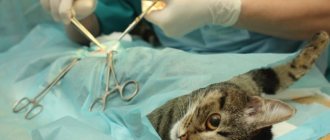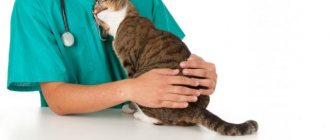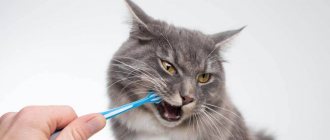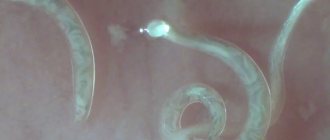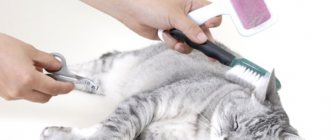Unfortunately, cats are susceptible to the same diseases as humans. Various allergic reactions of animals are considered to be quite common; they can occur to anything: bites of fleas, mosquitoes, wasps, house dust, pollen of house plants, chemicals, medicines. Food allergies in cats are also common, which bothers our pets and occurs due to food. In our article we will tell you how to recognize a food allergy, consider the most common symptoms, and tell you what principles should be followed when selecting food.
Food allergies
Many people mistakenly assume that if a cat has itching and a rash, it has eaten something wrong. In fact, food allergies are only 10% of all possible allergies. But it is possible. Many pet owners face this problem.
The occurrence of a reaction, in fact, does not depend on how expensive and high-quality food you buy for your cat. Even to special hypoallergenic food, allergic reactions can occur, because it all comes down to the animal’s body. Also, the manifestations do not depend on the sterilization of the animal, its breed, age, or weight.
Quite often, the tendency to allergies is inherited.
How to check which food component causes an allergic reaction
In order to carry out the treatment as effectively as possible, it is very important to exclude the ingredient that gives the animal an allergy. To do this, you need to identify this component, and this is a rather difficult procedure. Allergy treatment will not give a positive result if the cat regularly consumes food that causes a reaction in the body.
The principle of the test is that the animal is transferred to a new type of food for 3 months. At this time, the cat must have a strict diet, that is, the consumption of sweets, any flavorings, and medications must be excluded; the animal must consume only the selected food and water. After 3 months, you can accurately say whether the cat has an allergic reaction to this type of food.
Some cats have an allergic reaction to a new type of food immediately after consumption, while in others it may take several months.
Allergy to food in cats: when does this phenomenon occur?
The immune system, having encountered a substance that is actually safe, may perceive it as a threat. Then the inflammatory process, which we call allergy, starts. A reaction to food occurs in cases where the cat’s body has detected allergens in the composition.
Allergy to natural food
In most cases, the cause of allergies is protein. Moreover, a reaction to beef or chicken can take a very long time to develop; the allergen will accumulate in the body throughout the year. Eggs, fish and wheat can also cause food allergies.
Allergy to dry food
Allergies most often develop to dry food. It contains many chemical additives, dyes, and flavor enhancers. It contains a high concentration of animal protein, so susceptibility can appear even to expensive and high-quality food.
This allergy develops very quickly, which means it is detected at a fairly early age of the kitten.
Allergy to wet food
Wet food is the least allergenic. It contains a lot of water, which means that fewer irritants enter the body. Allergies to wet food develop more gradually than to dry or natural food. The onset of symptoms is less severe, and it may take a long time before the owner discovers that something is wrong with the animal.
What could be the reaction to (types of allergies)
Allergies in cats can be food or non-food. In the first case, allergens are exclusively food products, and in the second - all remaining factors. That is why the non-edible species contains several subspecies.
For food (food)
Food allergies in cats occur when they consume animal or plant ingredients. Depending on the sensitivity threshold, the reaction may not occur immediately, but after several months of constant consumption of a certain type of food.
When using natural products, veterinarians recommend avoiding chicken. Unscrupulous producers often resort to dangerous antibiotics that accelerate the growth of chickens.
Of course, it is forbidden to give cats spices and food with spices, smoked meats and sweets - these products can cause severe allergies or develop an eating disorder.
For flowering and chemicals (chemical)
In case of non-food type of pathology, allergens are plant pollen and chemicals: cosmetics, household chemicals, tobacco smoke, cat litter. In the first case, symptoms manifest themselves seasonally, and in the second they can be observed constantly.
For insect bites (parasitic-insect)
The most common cause of the disease is bites of blood-sucking parasites (fleas, ticks, lice eaters). When sucking cat blood, the parasites inject their saliva, which contains a protein foreign to the body of the furry pet. It is this that causes a protective reaction from the body.
Autoimmune (atopic)
It is recognized as the rarest species and provokes the development of allergic dermatitis. Appears during an abnormal response from the immune system. The body begins to mistake its own cells for allergens and destroys them.
Allergy to food or food intolerance: how to distinguish between these pathologies
Food intolerance and food allergy are often confused because both pathologies are caused by the animal's diet. However, it is important to distinguish between them, because the future health of the animal depends on the correct treatment.
With allergies, the main symptoms occur on the pet's skin, while with food intolerance, problems with the gastrointestinal tract are observed. Food intolerance does not appear from the allergenicity of the product, but most often from its quantity. With this disease, the body simply cannot digest certain foods because it does not have the necessary enzymes.
Prognosis and possible complications
The disease cannot be cured, so all treatment comes down to eliminating allergens and stopping the symptoms that arise. In the absence of drug therapy, a furry allergy sufferer’s immunity suffers and internal pathologies develop. He becomes more vulnerable to viral infections, and his attacks can become chronic.
Of particular danger is bronchial asthma, which occurs in severe and acute form. It causes respiratory failure, which can be fatal if oxygen levels are too low.
With the right diet and lifestyle, the cat will feel the same as a healthy animal - without experiencing discomfort or suffering.
How do food allergies manifest in cats?
Many people mistakenly believe that a skin rash appears as a result of the allergic reaction itself, but it indicates a secondary phenomenon - bacterial inflammation. And the symptoms of the allergy itself are itching, hair loss, blisters, nasal discharge and even vomiting with diarrhea, with prolonged exposure to the allergen.
If your pet is allergic to dry food, then you can pay attention to the fact that the cat begins to sneeze heavily while sniffing the granules. There may also be itching in the nose and eyes, which over time spreads to the whole body.
If you ignore the symptoms, small wounds will soon begin to appear on your cat’s skin, and in the future, eczema. In the photos of sick animals you can see that food allergies are characterized by skin damage in the head and neck area.
Reasons for reactions
Food and non-food allergies in cats occur due to increased sensitivity of the immune system. Harmless irritants are perceived by immune cells as a dangerous enemy. As a result, the amount of free histamine in the body, an organic compound that causes an allergic reaction, increases.
In addition to the previously listed factors, the development of pathology is influenced by:
- weakened immunity resulting from improper maintenance, poor feeding or chronic diseases;
- prolonged stress;
- similar diagnoses for the cat’s parents and grandparents;
- prolonged helminthiases;
- infectious diseases;
- drug intolerance.
Allergy symptoms in a cat can appear at any age. Their severity is determined by the amount of allergen ingested and the duration of its exposure.
How to find out what causes cat food allergies
It is very difficult to find out which allergen causes such a reaction. Even more difficult is to remove it from the diet. Therefore, the best option would be to go to a specialist in the clinic as soon as symptoms are identified.
You should not self-medicate, because symptoms similar to food allergies appear in atopic dermatitis and some other diseases.
To determine which product your pet is allergic to, an elimination diet is used. All nutritional components in it are replaced with hypoallergenic ones, and special food is purchased. As soon as the allergy symptoms go away, the diet is changed to a provoking one - elements are introduced one at a time and the body's reaction is monitored. This is a very time-consuming detection method, but, alas, there is no other method.
It is very important to carefully monitor that during these diets the cat does not receive additional nutrition, which can confuse the clinical picture.
Proper cat nutrition
To prevent allergies in your furry pet, you need to take care of its proper diet. Cats definitely need a lot of protein. It is important to diversify your diet by introducing different types of meat and fish into your diet. When eating a natural diet, proteins should be combined with rice, buckwheat, and oatmeal, but there should be little porridge, since excess carbohydrates are not good for the animals. But vegetables are necessary. You need to stew cabbage, broccoli, zucchini, cauliflower, carrots. Fermented milk products and egg yolk are also needed. Your pet's diet must be carefully prepared to ensure it does not lack essential nutrients.
If the owners decide to give their pet dry food, they also need to choose it carefully. This product should not contain soy, corn, or wheat. It is not advisable to feed your animal food that contains preservatives or dyes. You cannot give your pet food from the common table. You should also not add wet food. The cat should only eat the selected dry food.
Treatment of food allergies
There is no remedy that will definitely help against allergies. How to treat it in this case? After detecting the substance that caused the reaction, the animal must be given help. To treat the allergy itself, the allergen that caused it is simply excluded from the diet.
Relieving symptoms is another matter, because itching and ulcers on the skin can torment your pet for a long time. To eliminate symptoms, the doctor prescribes special medications at his discretion.
Treatment cannot be started before the allergen has been identified: in this case, it is unclear whether the product was removed from the diet, or whether the medications taken had an effect.
Diagnostics in different conditions
You won’t be able to determine what your cat may be allergic to on your own. The symptoms of the disease often overlap with pathologies of internal organs and infections. After detecting alarming signs, make an appointment at the veterinary clinic for laboratory tests.
Laboratory research
To identify the allergen, the veterinarian takes a blood test, performs intradermal testing, and uses a method of exclusion. With a positive diagnosis, an increased amount of immunoglobulin E and eosinophils are detected in the blood serum - compounds that fight foreign or potentially dangerous substances.
Intradermal testing is performed less frequently. Animals undergo this procedure exclusively under anesthesia, which distorts the final results. The most accurate method is the elimination method, that is, the exclusion method.
If asthma is suspected, the veterinarian will listen to breath sounds and take a chest x-ray. In the absence of noise and thickening of the walls of the bronchi, bronchoalveolar lavage is prescribed - the introduction of sterile liquid into the bronchi for the purpose of subsequent removal and study. The procedure is performed under general anesthesia and has a number of contraindications.
Elimination method
It is possible to find out what your cat may be allergic to by consistently eliminating suspected allergens. Depending on the existing signs, the veterinarian will recommend changing food, changing household chemicals or filler.
If the elimination method and other studies do not produce results, the veterinarian prescribes drug treatment. When the symptoms disappear, the diagnosis is confirmed.
